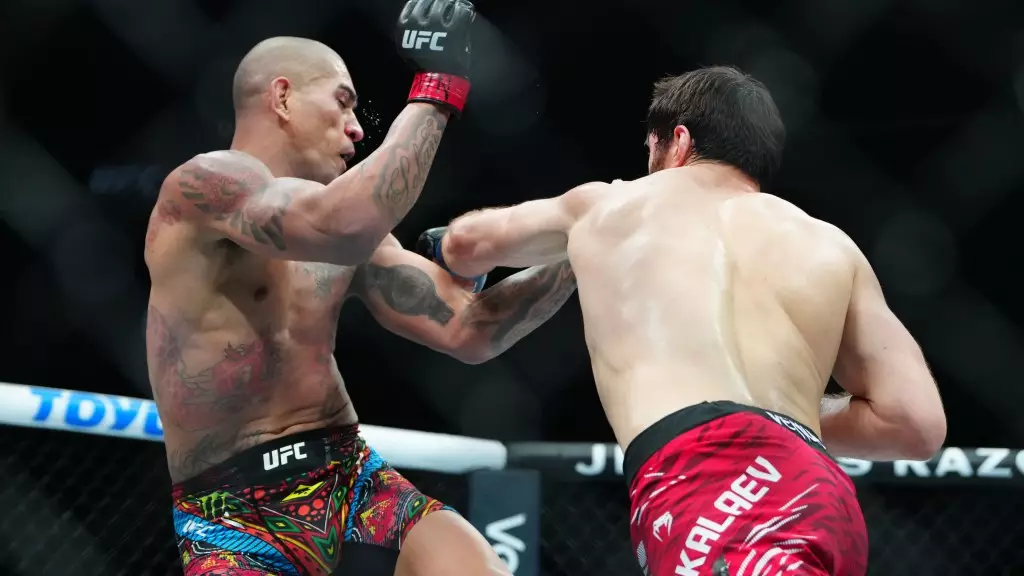Following the pivotal battle at UFC 313, in which Alex Pereira faced off against Magomed Ankalaev, the discourse around a potential rematch has taken center stage. Pereira’s loss via unanimous decision may seem slight in the grand scheme of a fighter’s career, but it raises critical questions about his immediate future in the light heavyweight division. Anecdotal observations from competitive MMA analysts, like Chael Sonnen, highlight a crucial insight: taking a rematch so soon after a challenging defeat might be ill-advised. Pereira’s apparent strengths, such as his takedown defense—he successfully thwarted all of Ankalaev’s attempts—could be overshadowed by the persistent reality of their first encounter.
Dissecting the First Fight
Even though Pereira demonstrated commendable resilience by defending against numerous takedowns during their first clash, it wasn’t enough to secure a victory in a fight that many categorized as uncompetitive. Sonnen aptly pointed out that the contest swayed heavily in Ankalaev’s favor, with the scorecard reflecting a striking imbalance. Despite moments of brilliance from Pereira, namely his defensive capabilities, he ultimately struggled to impose his will on the fight. Sonnen’s evaluation underscores a stark truth: a rematch with Ankalaev may not yield different results, especially since both combatants are expected to emerge from their initial fight with broader tactical understanding.
A Risky Proposition
Venturing into a rematch with a record like Pereira’s suggests a profound gamble on his part. According to Sonnen, the trajectory that led Pereira to the light heavyweight division was not paved through triumph but rather set against the backdrop of past defeat. His previous setbacks at middleweight could shape public perception, positioning him as a fighter who followed a less-than-stellar path to 205 pounds. The reality is, rather than elevating his status, a second consecutive loss could dull his shine and diminish future opportunities, pushing him further from title contention.
Perhaps even more troubling is the notion that a fighter’s marketability can suffer from consecutive failures. While it’s true that fighters often bounce back from losses, two in a row can present a narrative difficult to overcome. Sonnen’s view reveals a nuanced understanding of MMA marketing; Pereira’s ability to capture attention stems not just from skill, but from maintaining an aura of success and bravado. A second loss could change that dynamic completely.
The Mental Game
Consider the psychological ramifications of a rematch for an athlete like Pereira. Fighting Ankalaev again, so soon after a tough defeat, might induce mental strain. Losing can be a heavy burden, and the pressures of performance at the elite level can exacerbate this, potentially undermining Pereira’s confidence. Sonnen warns that taking on the same opponent—especially one he has already struggled to defeat—could lead to a detrimental cycle, where doubt creeps into his psyche. Successful fighters, like champions, need to exhibit mental fortitude and unwavering self-belief; stepping back into the octagon against Ankalaev could challenge that foundation.
The Road Ahead
Instead of jumping straight back into a rematch, it may be wiser for Pereira to explore alternative paths before locking horns with Ankalaev again. Perhaps engaging in a fight against a top contender who offers a contrasting style could present opportunities to hone skills while simultaneously regaining confidence. Sonnen advocates for patience, suggesting that capitalizing on the momentum generated from his takedown defense could lead to better outcomes down the line.
While Pereira’s path back to prominence in the octagon will undoubtedly face challenges, a rematch with Ankalaev might just be the most hazardous of them all. The allure of revenge can be powerful, but, in this case, a strategic retreat could enhance his chances of future success, ultimately enabling him to reclaim his elite status in mixed martial arts rather than risk further setbacks.

